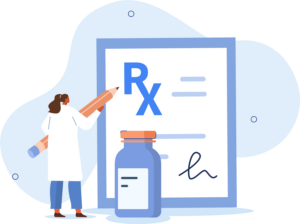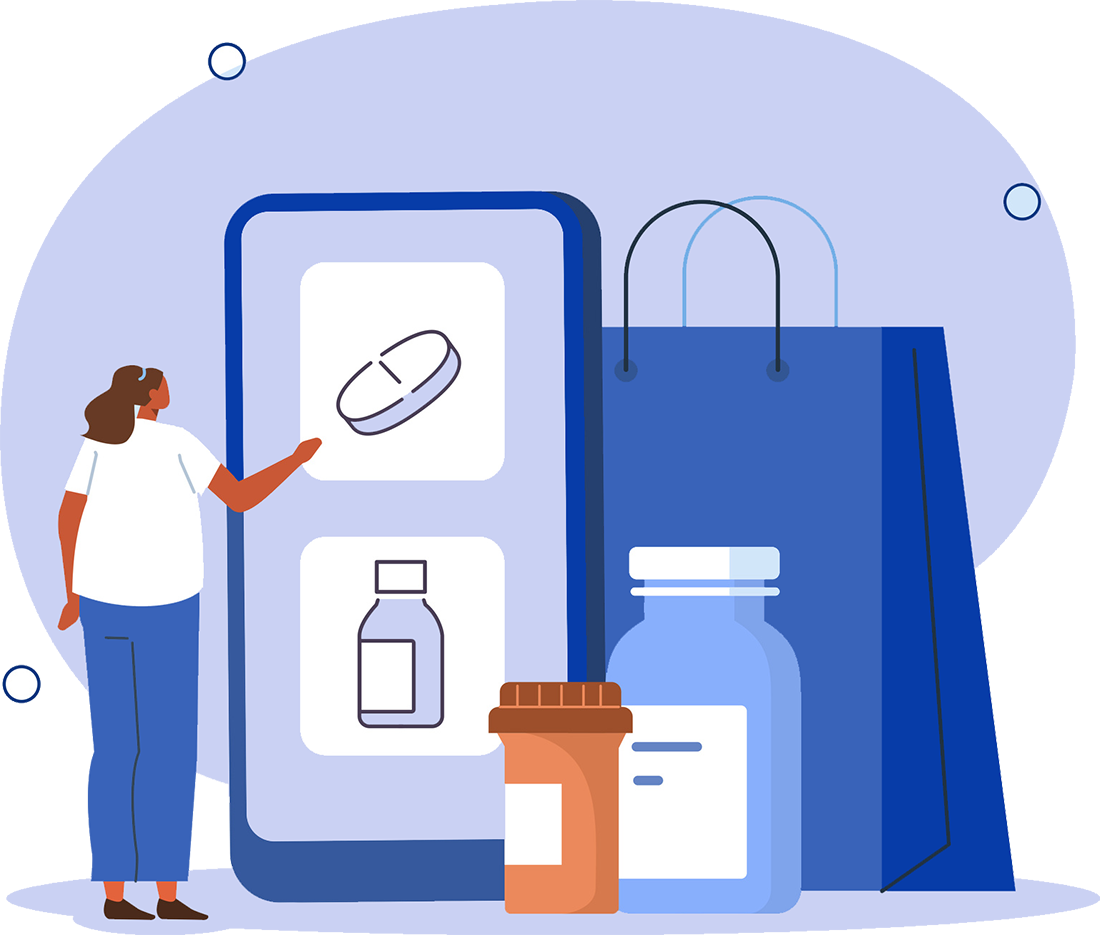Suboxone, a brand name for the drug combination of buprenorphine and naloxone, has emerged as a game-changer in the realm of opioid addiction treatment. This innovative medication works by addressing both the physical and psychological aspects of opioid dependence, offering a comprehensive solution to those struggling with opioid use disorder (OUD).
Suboxone is prescribed as a form of Medication-Assisted Treatment (MAT), and works best when integrated into a comprehensive treatment plan that addresses all aspects of addiction, not just the physical dependence. However, it can still be effective on its own.
The duration of suboxone treatment varies from person to person. On average, people will stay on suboxone for 6 to 12 months, eventually tapering off the medication under the supervision of their care team. Some people prefer to stay on suboxone indefinitely.
Your journey begins with a comprehensive evaluation by a qualified healthcare provider. During this initial assessment, you’ll discuss your medical history, substance use patterns, and any co-occurring mental health conditions. With this information, your provider can create a specialized treatment plan for you.
Once the assessment is complete and you have experienced at least 12 hours of opioid abstinence, you’ll be ready to begin treatment. Under the supervision of your healthcare provider, you’ll receive your first dose of Suboxone, typically in the form of a dissolvable film placed under the tongue or inside the cheek.
The induction phase is a critical step, as it helps alleviate the intense withdrawal symptoms associated with opioid cessation. Your provider will closely monitor your response to the medication and adjust the dosage accordingly, ensuring that you receive the optimal level of relief while minimizing any potential side effects.

After the initial induction phase, you’ll enter the stabilization and maintenance phase of your Suboxone treatment. During this stage, your healthcare provider will work with you to find the ideal dosage that effectively manages your cravings and withdrawal symptoms, allowing you to focus on the psychological and behavioral aspects of your recovery.
Regular follow-up appointments and counseling sessions will be an integral part of this phase. These sessions will provide you with the necessary support and guidance to develop healthy coping mechanisms, address underlying issues that may have contributed to your addiction, and build a strong foundation for long-term sobriety.
As you progress through your recovery journey, your healthcare provider will closely monitor your progress and determine when it’s appropriate to begin tapering off Suboxone. This process involves gradually reducing your dosage over time, allowing your body to adjust and minimize the risk of relapse. This tapering process can take months or even years, depending on individual circumstances.
Tapering and discontinuation of Suboxone should never be attempted without the guidance of a medical professional. Abruptly stopping Suboxone treatment can lead to severe withdrawal symptoms and increase the likelihood of relapse.
Throughout this phase, you’ll continue to receive counseling and support to help you navigate the challenges that may arise and develop strategies for maintaining your sobriety after discontinuing the medication. As mentioned, many people find Suboxone crucial to maintaining stability and prefer to stay on the medication indefinitely.
Suboxone treatment has demonstrated significant effectiveness in managing opioid use disorder. Here are some key statistics that highlight its success:
Less Opioid Use: Studies have shown that patients on Suboxone experienced a 14.2% reduction in positive drug tests for opioids, indicating a decrease in illicit opioid use during treatment.
Retention in Treatment: Patients taking Suboxone are about 1.82 times more likely to stick with their treatment than those on a placebo. This indicates a strong engagement with the treatment process.
Reduction in Mortality Rates: A report from the Substance Abuse and Mental Health Services Administration (SAMHSA) found that Suboxone treatment led to a 50% reduction in mortality rates among patients with opioid use disorder, showcasing its potential to save lives.
Ever since the COVID-19 pandemic, individuals can now receive suboxone prescriptions and ongoing support from healthcare providers without the need for an initial in-person consultation. Online suboxone treatment can be as effective as traditional in-person care, with the added advantage of higher accessibility and flexibility.
While Suboxone treatment is very successful at managing the physical aspects of opioid addiction, a comprehensive treatment approach also incorporates various complementary therapies to address the psychological and emotional components of recovery. This is why treatment programs usually include the following services on top of MAT:
Counseling sessions provide a safe and supportive environment for you to explore the underlying causes of your addiction, develop healthy coping mechanisms, and build a strong support network.
These sessions are facilitated by trained professionals who understand the unique challenges of addiction recovery and can guide you through the process with empathy and expertise. They often incorporate Cognitive-Behavioral Therapy (CBT), a widely recognized and effective approach in addiction therapy.
Peer support offers people in recovery a sense of community and shared understanding that no other form of treatment provides. It creates a safe space for individuals in recovery to share their experiences, offer encouragement, and learn from one another’s journeys. Peer support is usually available in group settings or in a one-on-one format, where you meet with a peer recovery specialist to discuss your progress, struggles and needs.
Online outpatient programs like Eleanor Health can help you start your recovery journey from the comfort of your own home, including your suboxone treatment.
Our suboxone program typically involves virtual consultations, medication delivery, and complementary remote counseling and peer support sessions. We also have in-person appointments available at select locations for patients who need that face-to-face support.
 Virtual Addiction Treatment: is it as Effective as In-Person Treatment?
Virtual Addiction Treatment: is it as Effective as In-Person Treatment?
 Methadone vs. Suboxone for Medication-Assisted Treatment: What’s the Difference?
Methadone vs. Suboxone for Medication-Assisted Treatment: What’s the Difference?
 Does Insurance Cover Online Rehab and Medication-Assisted Treatment?
Does Insurance Cover Online Rehab and Medication-Assisted Treatment?